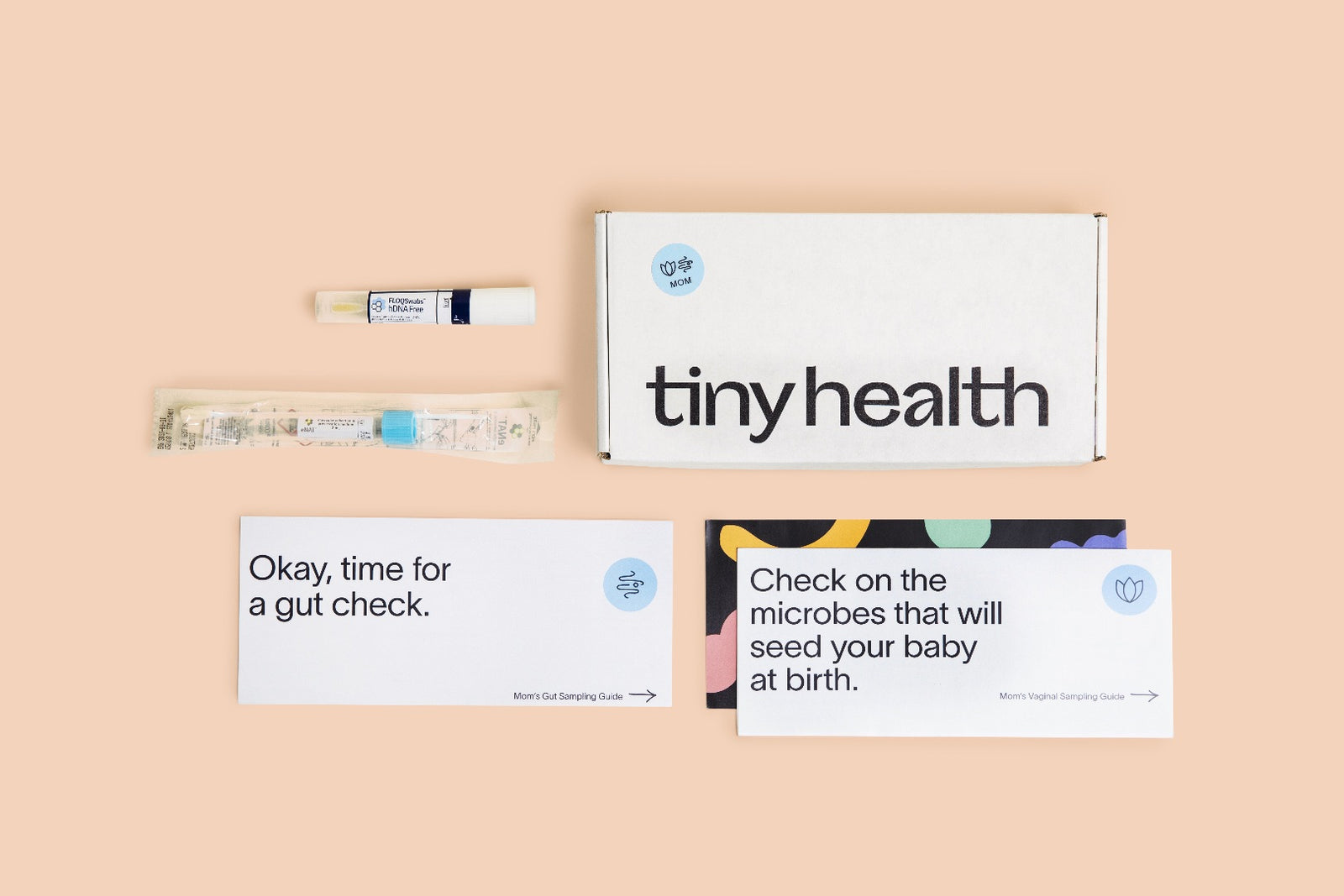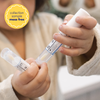Your Cart is Empty
Continue shoppingEczema 101: Exploring the Link Between Eczema and Gut Health
Expert reviewed by Tiny Health | Published October 22, 2024
share this article

From the first signs of red, itchy patches to sleepless nights, watching your child struggle with eczema is heartbreaking. Eczema impacts millions of children worldwide, so if you’re a parent searching for answers, you’re not alone.
Tiny Health, founded by a mom for moms, takes a holistic approach to this condition by focusing on gut health. As the first gut health test of its kind for babies, Tiny Health explores how eczema is more than just a skin issue — it’s a complex puzzle influenced by genetics, immune function, skin barrier health, and environmental triggers. For some little ones, the missing piece is found in their gut microbiome, which plays a crucial role in overall health.
In this guest blog, the Tiny Health team delves into eczema basics, the gut-skin axis, and holistic ways to manage and treat the condition while supporting your child’s well-being.
Eczema basics: What it is and how to spot it
Eczema, or atopic dermatitis, is a common skin condition in young children. It manifests as dry, red, and itchy patches on the skin, typically on the cheeks, arms, or legs.
60% of eczema cases begin in the first year of life, making it one of the most common skin conditions in babies and toddlers [1]. Unfortunately, baby eczema often precedes the arrival of other immune conditions, such as food allergies, asthma, and allergic rhinitis. This cluster of immune conditions is called the atopic march [2].
Various triggers can set off flare-ups, including allergens, irritants, and temperature changes. Even something as simple as a scratchy sweater or blanket can irritate your child’s skin. Genetics can also play a role — your little one may be more prone if eczema or allergies run in your family.
Recognizing the signs of eczema early can help you take steps to manage it. Common symptoms include:
-
Dry, sensitive skin
-
Intense itching, especially at night
-
Red or inflamed patches
-
Small, raised bumps that may leak fluid
-
Thickened, cracked, or scaly skin
While external factors can trigger eczema, recent research highlights the importance of gut health in managing the condition. Your child’s gut microbiome — the universe of microorganisms in their digestive system — plays a crucial role in developing their immune system and regulating inflammation.
An imbalance in gut bacteria can lead to increased inflammation throughout the body, which may manifest as eczema on the skin. Supporting the health of your child’s gut microbiome may help reduce inflammation and improve eczema symptoms.
The gut-skin connection: how your baby's microbiome affects eczema
You may wonder how your child’s tummy is connected to their skin. Well, the gut and skin are more intertwined than we once thought. Here's how:
- Immune system development: A big part of your immune system is in your gut. The gut microbiome helps teach the immune system to react to different substances. If it’s off-balance, the immune system may overreact, leading to inflammation and conditions like eczema [3].
- Inflammation regulation: Good gut bacteria create compounds that help reduce inflammation in the body, including the skin.
- Barrier function: A healthy gut microbiome keeps the gut lining strong, stopping unwanted substances from triggering immune responses that can lead to skin problems.
A Kiddo Poop Test is one of the first steps toward understanding eczema and the gut microbiome connection. Your child’s gut microbiome develops rapidly in the first 1,000 days of life. With this insight, you can take steps to support their gut health early, which may help reduce their microbiome risk or ease symptoms.
Natural remedies for eczema
Standard eczema treatments usually include creams like corticosteroids or calcineurin inhibitors, but many parents have concerns about using them — and for good reason. Prolonged use of high-potency corticosteroids may cause side effects such as skin eruptions or skin atrophy, and initial application of calcineurin inhibitors can cause local burning and stinging [4].
Many parents share these concerns and want to explore gentler ways to care for eczema. If you're searching for holistic alternatives, here are a few natural treatments that are kinder on your little one's skin:
- Coconut oil: A natural moisturizer with antibacterial and anti-inflammatory properties. Apply a thin layer of virgin coconut oil to affected areas to help hydrate and soothe the skin. It's gentle enough for daily use.
- Hypochlorous Acid (HOCl): HOCl is a gentle solution that helps soothe eczema by reducing bacteria and inflammation. Plus, it’s safe for sensitive skin.
- Oatmeal baths: Adding colloidal oatmeal to your baby's bathwater can soothe itching and reduce inflammation. Oatmeal has skin-protective qualities that can provide immediate relief from discomfort.
- Aloe vera: Known for its healing properties, pure aloe vera gel can cool and calm irritated skin. Ensure you use a product without added alcohol or fragrances, which can irritate sensitive skin.
- Shea butter: An excellent natural moisturizer rich in vitamins A and E, raw, unrefined shea butter can help repair the skin barrier and lock in moisture.
- Calendula cream: Made from marigold flowers, calendula cream has anti-inflammatory and healing properties that can soothe irritated skin.
Remember to patch-test any new treatment on a small area of your baby's skin to ensure it doesn't cause sensitivity or allergic reactions.
A gut-friendly diet
What your child eats can significantly impact their gut microbiome. Consider these dietary adjustments:
Prebiotic foods: If your baby is old enough for solids, give them bananas, apples, and oats. They contain prebiotics, which feed the good bacteria in their gut. Including these in your child’s diet can promote a healthier microbiome.
Prebiotic Supplements: When extra support is needed, prebiotic supplements, like Begin Health’s Growing Up Prebiotics, provide ingredients such as 2’-FL HMOs and chicory root fiber to help feed healthy gut bacteria, supporting digestion and a balanced immune system.
Probiotic-rich foods: Introduce foods like yogurt with live cultures (ensure it's appropriate for their age and free from added sugars). Probiotics can help boost healthy gut bacteria, potentially reducing inflammation and improving eczema symptoms.
Breastfeeding: If you're breastfeeding, continue if possible. Breast milk contains beneficial bacteria and prebiotics that support your baby's developing gut microbiome.
Always consult your healthcare provider before significantly changing your child’s diet.
Consider a probiotic
You may be wondering, does my baby need a probiotic? If your baby’s gut test shows they lack important bacteria likeBifidobacterium,a probiotic may be recommended. These bacteria have special functions like digesting HMOs — special sugars from breastmilk that feed beneficial gut bacteria — and help your baby’s immune system mature [5].
For babies 0-12 months, Beginbaby Prebiotic + Probiotic contains 2'-FL HMOs and two strains ofBifidobacteriumwhich can help fill in the gaps.
Probiotics containing specific strains of bacteria likeLactobacillus rhamnosus GGmay also be useful, as they have been linked to help with eczema symptoms [6], [7]. But remember to test before starting a probiotic to know exactly which strains your baby’s gut needs. That way, you won’t be guessing and giving them something they already have in abundance.
Course correcting starts with a gut health test
After you've done our Kiddo Poop Test, if you're curious how your little one’s gut health might be affecting their eczema, the Tiny+ Targeted Eczema Gut Rebalance program can provide valuable, science-backed insights into your child's unique gut microbiome. You’ll find out if your baby has any gut imbalances, like missing good bacteria or having too many that can cause inflammation. During your 1-on-1 functional health coaching sessions, you’ll review your results with a microbiome specialist. And get actionable dietary, supplement, and lifestyle recommendations in a personalized Action Plan. You'll also see how your changes impact your baby's gut health and eczema over time.
If your baby is under 6 months old and isn't showing signs of eczema yet, you can find out if they have an increased microbiome risk of developing eczema.
Uncovering the root causes of your baby's microbiome issues is empowering and a helpful first step in making informed choices about their health.

Author
Tiny Health
Trending

How to Transition Kids Off Stool Softeners Safely
read now
How to Know If Your Kid Needs a Stool Softener (or Something Else)
read now
Why Parents Are Choosing Prebiotics Over Stool Softeners for Kids
read now








